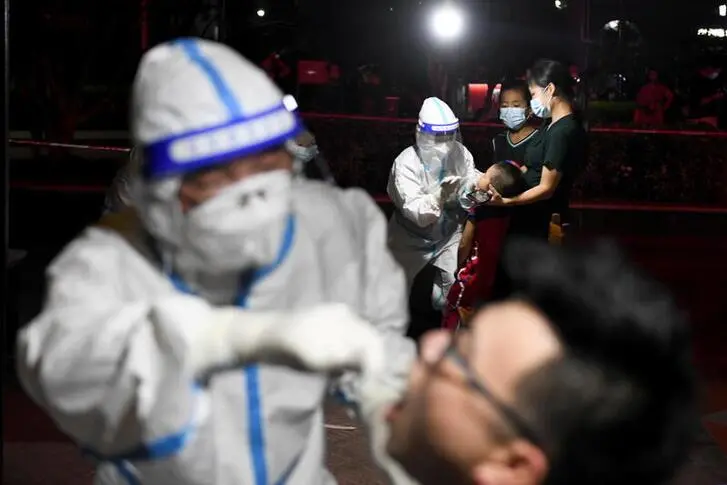PHOTO
(The author is a Reuters Breakingviews columnist. The opinions expressed are her own.)
HONG KONG - Diseases have no borders, but biotechnology companies do. The sector has been immune to U.S.-China tensions so far, but political risks are building. The industry is entering a golden age in the People’s Republic. Chinese entrepreneurs who moved abroad are coming home to find favourable government policies and ample funding awaiting. Rising mRNA technology star Suzhou Abogen Biosciences, led by a former Moderna scientist, raised over $1 billion last year alone from backers like SoftBank's Vision Fund and Temasek. Consulting firm ChinaBio reckons investments into Chinese healthcare hit $38 billion in 2021, up by a third from the previous year.
International partnerships have buoyed rising stars like $27 billion BeiGene. Founded in China over a decade ago, the group boasts three listings in Shanghai, Hong Kong and New York, and three global headquarters; it operates in over 20 countries. It unveiled an up-to-$1 billion agreement with Novartis for its innovative cancer treatment in late December. Of the 500-plus pharmaceutical and biotech collaborations in China in 2021, over 60% were cross-border, according to November data from ChinaBio.
It's a pleasant contrast to the dramatic financial decoupling underway in China's technology sector, prompted by diplomatic spats over accounting oversight, national security and other issues.
Markets are worried Chinese biotech’s exception won’t last. A media report that the industry might be targeted by U.S. sanctions triggered a huge selloff in December. Contract drugmaker Wuxi BioLogics 2269.HK , which generated over 50% of its first-half revenue in North America, shed over $10 billion in market value in a single day; BeiGene's Shanghai stock tumbled 16% on their debut.
Nothing has come of the rumours so far, but the sector is vulnerable. Companies that don't allow American regulators to inspect their audit work for three years can be kicked off New York bourses, putting BeiGene's Wall Street ticker at risk. In December, Beijing updated its list of sectors where foreign investment is banned or restricted, and left gene diagnostics and therapeutic technologies on it. That forces companies developing promising treatments like U.S.-listed Legend Biotech to rely on complex tenuous workarounds. A geopolitical stress test looks imminent.
CONTEXT NEWS
- Chinese biotechnology company BeiGene on Dec. 20 announced an option, collaboration and licensing agreement for its anti-cancer therapy, known as the TGIT inhibitor ociperlimab, with Swiss drugmaker Novartis Pharma. The deal will let Novartis develop, manufacture and commercialise the treatment in North America, Europe and Japan.
- Under the terms of the agreement, Novartis will make a $300 million upfront payment to BeiGene and pay a fee of up to $700 million upon exercise of an option by 2023.
- Ociperlimab is currently undergoing Phase 3 lung cancer trials globally.
(The author is a Reuters Breakingviews columnist. The opinions expressed are her own.)
(Editing by Pete Sweeney and Katrina Hamlin) ((For previous columns by the author, Reuters customers can click on MAK/ SIGN UP FOR BREAKINGVIEWS EMAIL ALERTS https://bit.ly/BVsubscribe | robyn.mak@thomsonreuters.com; Reuters Messaging: robyn.mak.thomsonreuters.com@reuters.net))





















